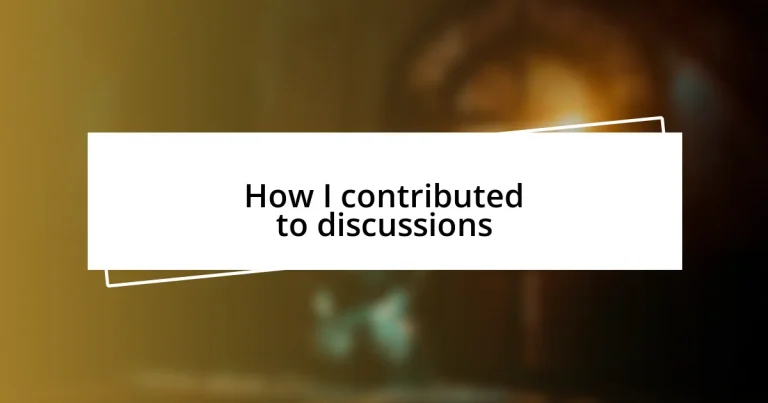Key takeaways:
- Discussion fosters growth, understanding, and community through active listening and sharing diverse perspectives.
- Preparation for discussions enhances confidence and allows for more meaningful contributions, including researching and reflecting on personal experiences.
- Constructive feedback should be specific, start with positive observations, and utilize “I” statements to enhance receptiveness and collaboration.
- Reflecting on discussion outcomes uncovers deeper insights, helps identify areas for improvement, and emphasizes the importance of storytelling in facilitating rich dialogues.
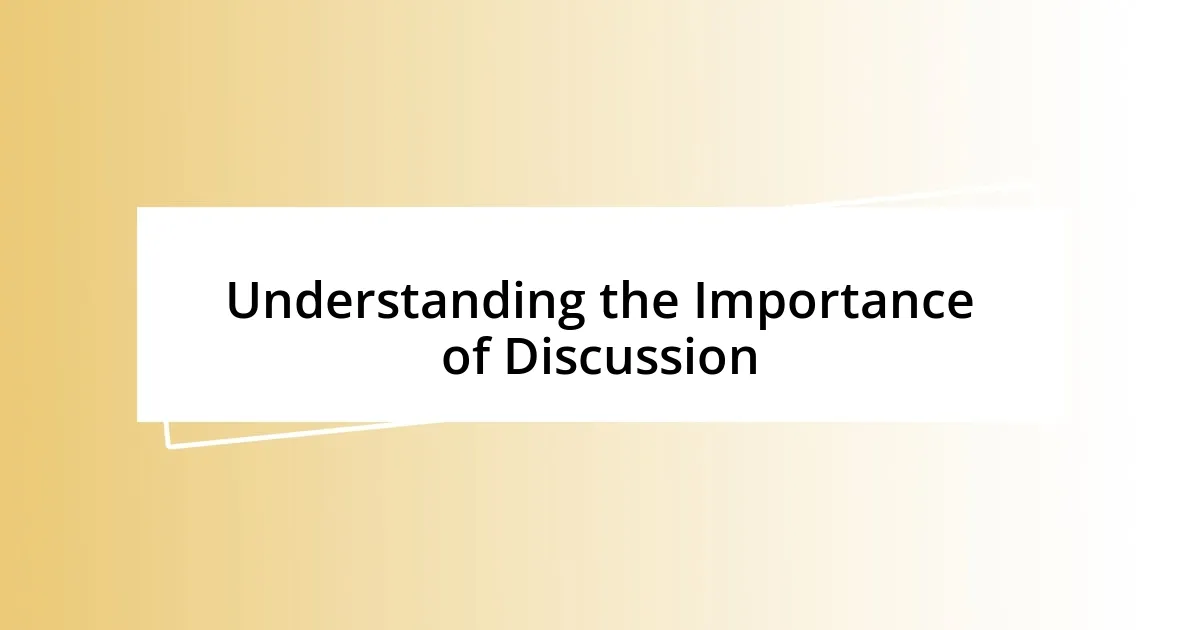
Understanding the Importance of Discussion
Discussion is a powerful tool for growth and understanding. I remember a time when I participated in a heated debate about climate change; it was eye-opening to hear viewpoints I had never considered. Can you think of a moment when a discussion changed your perspective on something important?
Through discussion, we not only share ideas but also learn to listen actively, which is an essential skill in our interconnected world. There was an instance where a colleague’s different approach to a project led me to rethink my own methods. It’s fascinating how open conversations can broaden our horizons, isn’t it?
Engaging in discussions fosters a sense of community and collaboration. I often find that when I share my thoughts—and listen to others—it creates a space where everyone feels valued. Have you noticed how mutual respect in talks can lead to innovative solutions that might not emerge in silence?
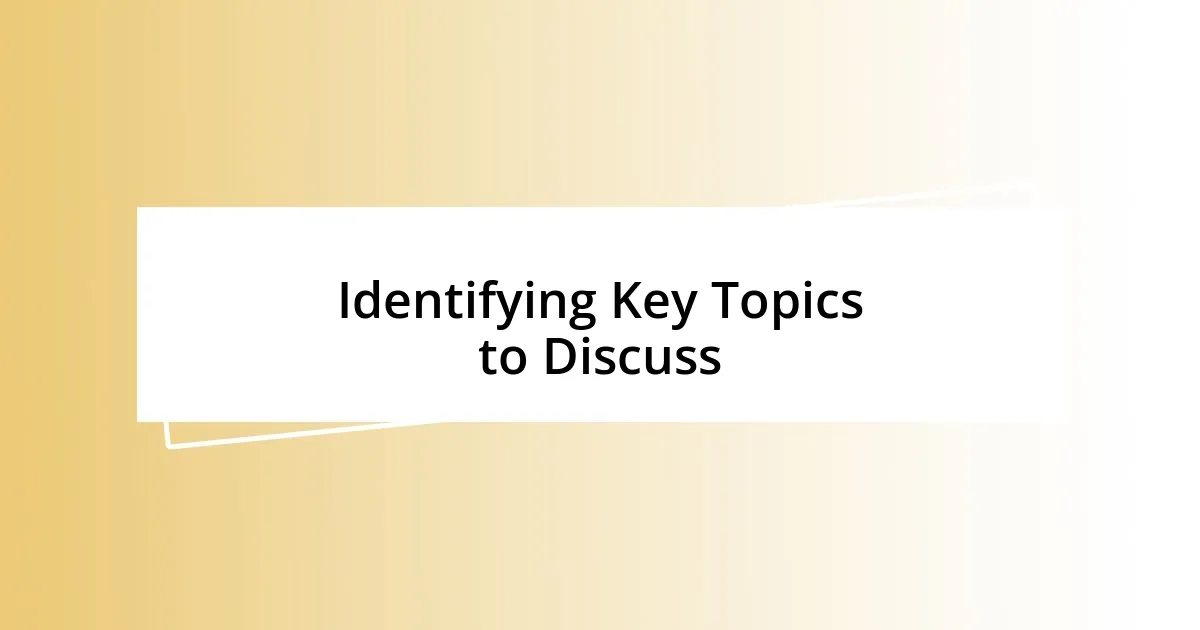
Identifying Key Topics to Discuss
Identifying key topics for discussion requires a thoughtful approach. I often start by reflecting on current events or trends that resonate with me and my audience. For instance, during a team meeting, we explored the implications of remote work on productivity, a topic many of us had opinions about. This sparked a lively exchange, illustrating how relevant themes can engage everyone.
I find it helpful to consider the interests and expertise of the participants as well. Once, while collaborating on a project, I suggested we discuss team dynamics, tapping into my experience as a facilitator. It turned out that everyone had meaningful experiences to share, and this led to productive conversations that strengthened our working relationships. Isn’t it amazing how aligning discussions with personal and collective experiences can stimulate deeper engagement?
Finally, I believe that prioritizing controversial topics can also generate invaluable dialogue. I recall a time when we tackled the ethical implications of artificial intelligence. The discussions that followed were intense yet enlightening, revealing diverse perspectives and fostering a richer understanding among us. What topics have you found most engaging when seeking input from others?
| Approach | Example |
|---|---|
| Reflect on current events | Remote work productivity |
| Consider participant interests | Team dynamics discussion |
| Focus on controversial topics | Ethics of artificial intelligence |
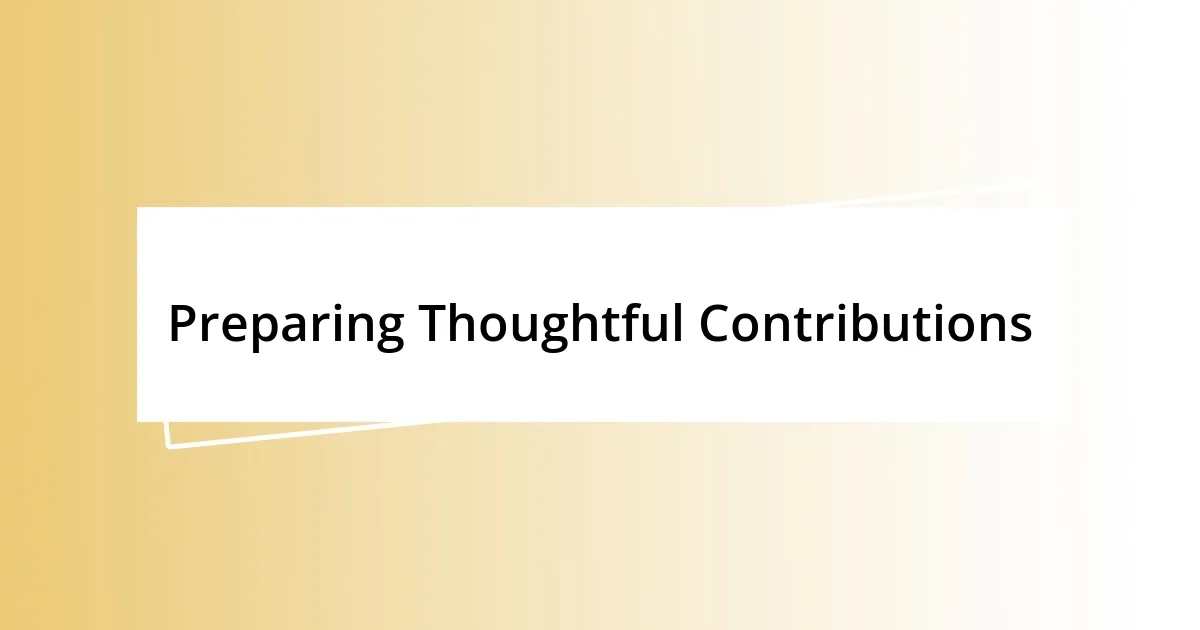
Preparing Thoughtful Contributions
Preparing thoughtful contributions is crucial for meaningful discussions. When I think about my own experiences, I realize that taking the time to prepare my thoughts beforehand enhances my confidence. One particular instance stands out: before a panel discussion on community health, I compiled data and anecdotes from local residents. This preparation not only armed me with facts but also connected me emotionally to the topic, allowing me to speak with passion. I felt like I was truly representing those voices, which made my contributions resonate more deeply.
Here are some key strategies I’ve found helpful for preparing my contributions:
- Research the Topic: Delve into literature, articles, or recent developments related to the subject.
- Reflect on Personal Experiences: Draw parallels from your life that will add a unique perspective to the conversation.
- Anticipate Questions or Counterarguments: Think about what others might ask or challenge to be ready with responses.
I’ve learned that preparing thoughtful contributions isn’t just about gathering information; it’s also about cultivating a connection to the topic that fuels a genuine discussion. In my experience, the more I care about what I’m discussing, the more engaged my audience becomes.
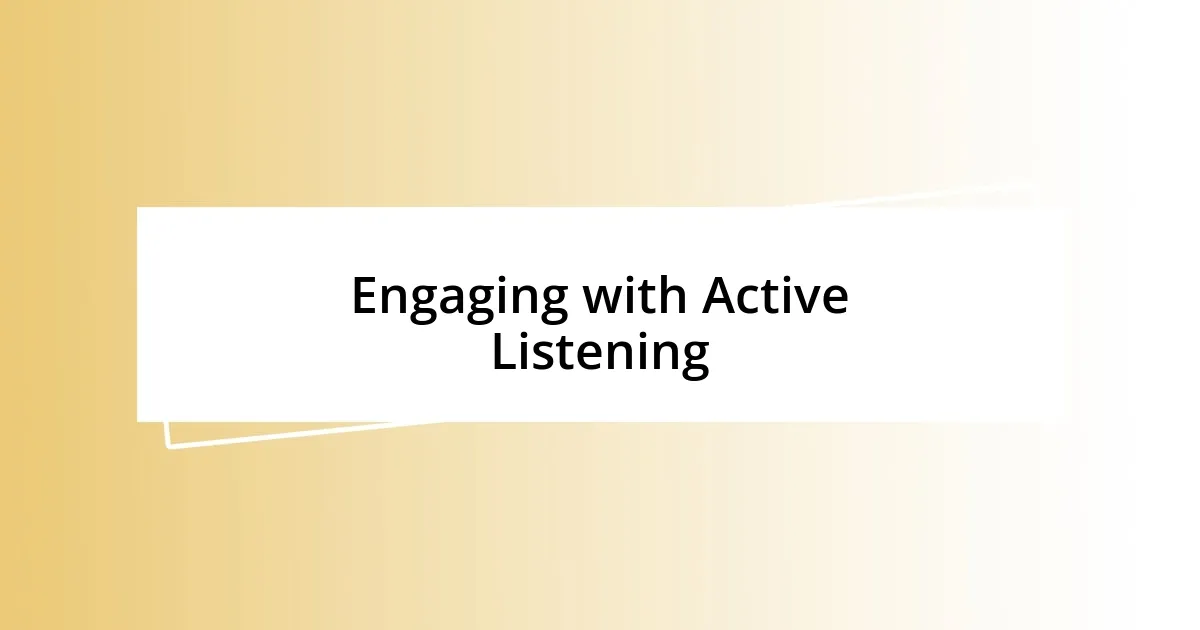
Engaging with Active Listening
Engaging with active listening transforms conversations into meaningful exchanges. I remember a time during a brainstorming session where I consciously practiced active listening. Instead of preparing my next response while others spoke, I focused entirely on understanding their viewpoints. This approach not only made my colleagues feel valued, but it also helped me catch nuances in their arguments that I might have otherwise overlooked. Have you ever noticed how people tend to share more when they feel truly heard?
When I actively listen, I try to mirror the emotions expressed by the speaker. During a discussion about mental health at work, one team member shared her struggles. By reflecting on her feelings and asking follow-up questions, I acknowledged her experience and encouraged others to share their thoughts. This simple act deepened our dialogue and fostered a safe space for honest expressions, reminding me of the power we hold in fostering connections through empathy.
I’ve found that summarizing what others have said can also be a game-changer in discussions. A few weeks ago, in a project debrief, I took a moment to summarize key points before moving on. It helped clarify our direction and ensured everyone was on the same page. Have you tried this technique? It often leads to rich discussions and reinforces collaborative understanding, making the dialogue collectively enriching.
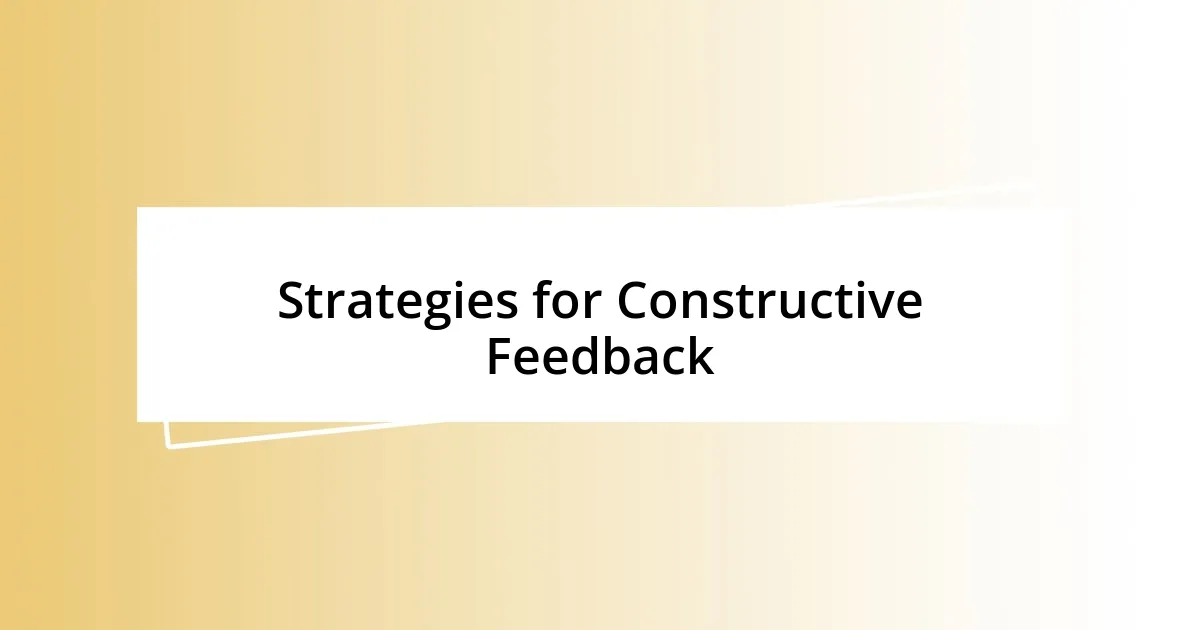
Strategies for Constructive Feedback
When it comes to giving constructive feedback, I’ve found that specificity is key. In one team meeting, I pointed out a colleague’s presentation skills, but instead of offering vague praise, I highlighted a specific slide where their visuals really popped. “That chart captured the data perfectly,” I said, which prompted a discussion about better design choices. Reflecting on this, I realized that when feedback is clear and actionable, it empowers others to excel rather than leaving them feeling lost or unsure. Doesn’t it feel great to know your words can genuinely help someone improve?
Another effective strategy is to begin with positive observations before addressing areas for improvement. I once provided feedback on a coworker’s project proposal, starting with what I admired about their innovative ideas. This really set a positive tone and made them more receptive when I suggested some adjustments. I think it’s often overlooked, but leading with strengths helps create a nurturing environment for constructive criticism. Have you ever noticed how a compliment can soften even the toughest conversations?
Lastly, I believe in using “I” statements, which are incredibly powerful in feedback situations. For example, during a performance review, I shared how a specific action from a teammate impacted our project’s progress. When I said, “I felt overwhelmed when deadlines changed without notice,” it opened up a dialogue about expectations and communication. This personal touch helped to foster understanding and showed that feedback is not just about pointing out flaws but enhancing collaboration. Isn’t it amazing how sharing our feelings can lead to more productive and empathetic discussions?
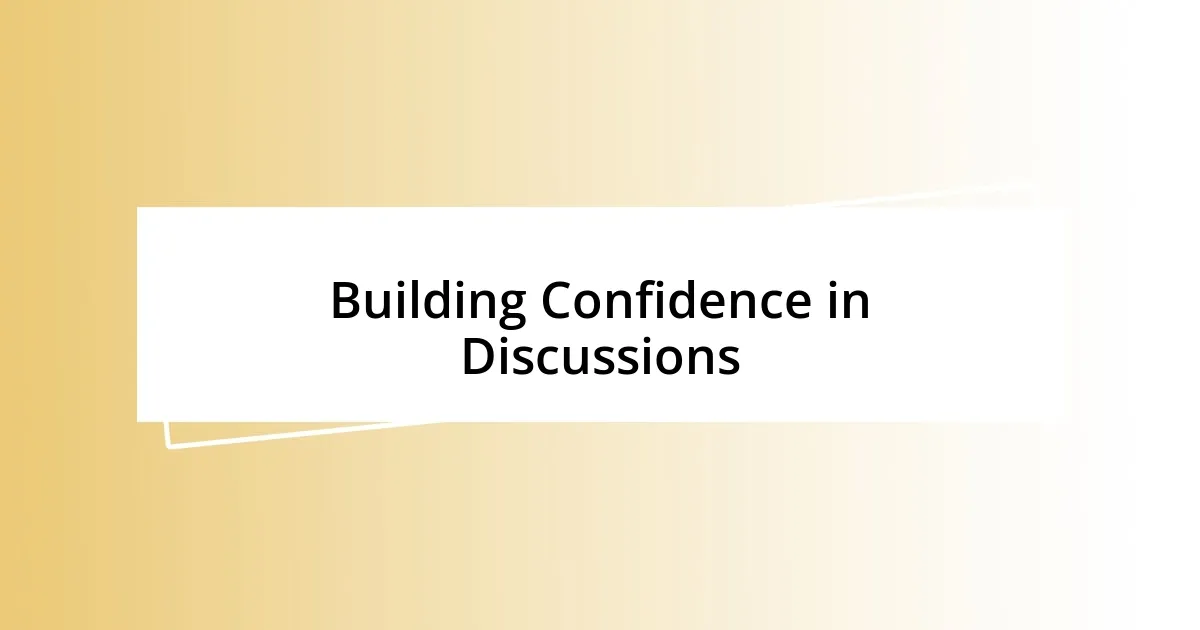
Building Confidence in Discussions
Building confidence in discussions often starts with preparation and self-reflection. I remember preparing for a team meeting about a challenging project. By jotting down my thoughts and potential contributions, I felt more equipped to speak up. Have you ever noticed how just the act of organizing your ideas can ease those nerves that build before a significant conversation?
Another important aspect is practicing speaking in diverse settings. I began participating in local community forums, which allowed me to engage with unfamiliar audiences. The more I shared my thoughts in these settings, the more comfortable I became expressing my opinions in work meetings. It’s fascinating how stepping out of my usual environment can shift my perspective and boost my confidence. Isn’t it rewarding to pursue opportunities that ensure we grow?
Lastly, celebrating small victories is crucial in building that confidence. Early in my career, I led a small presentation where I received positive feedback from my peers. That moment stuck with me, reminding me that my voice mattered. Reflecting on such experiences has helped me recognize the value I bring to discussions, pushing me to contribute more actively. When was the last time you acknowledged your own achievements in conversation? It’s these little wins that empower us to keep moving forward.
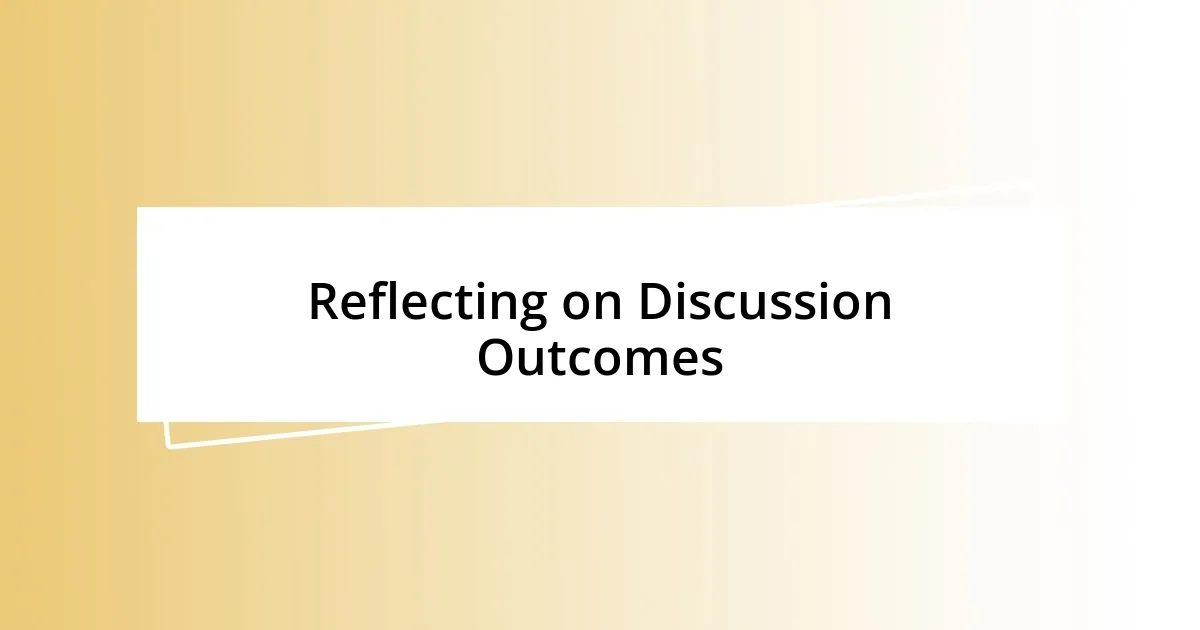
Reflecting on Discussion Outcomes
Reflecting on the outcomes of discussions is where the real learning happens for me. I recall a project brainstorming session where we explored numerous ideas, but one concept emerged as a favorite among our team. After the meeting, I took a moment to think about why that particular idea resonated with everyone. It made me realize that when we collectively celebrate a shared vision, it fosters a sense of ownership among team members. Isn’t it amazing how reflection can uncover deeper connections within a group?
I’ve learned that examining the decisions made during discussions can sometimes reveal areas for improvement as well. For instance, after a particularly heated debate over resource allocation, I found myself pondering what led to our final choice. I recognized that while passionate discussions are vital, they can overshadow quieter voices. This insight pushed me to advocate for more inclusive dialogue in future meetings. Have you ever considered how the dynamics of a conversation can shape its outcomes?
Sometimes, it’s the smaller moments in discussions that hold the most weight. I was part of a roundtable discussion where one participant shared a personal experience that shifted our entire perspective on the topic. Reflecting on that, I felt a deeper appreciation for storytelling in discussions—how sharing authentic experiences can lead to richer insights. It made me wonder: how often do we truly listen to the stories behind the ideas presented? Emotionally engaging with one another can transform discussions into a collaborative journey of discovery.












